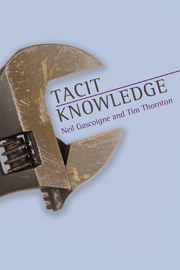1 - Three sources for tacit knowledge
Summary
1976 AND ALL THAT
In this chapter we will offer a preliminary explication of the concept of tacit or personal knowledge by focusing on aspects of the work of three thinkers: Michael Polanyi, Gilbert Ryle and Martin Heidegger. Having given this book its theme, the inclusion of Polanyi requires little justification; likewise that of Ryle, since, as we remarked in the introduction, there are good prima facie reasons for associating tacit knowledge with both knowing that and knowing how, yet it cannot seemingly be both. For some readers Ryle's anti-intellectualist argument for the primacy of knowing how will be sufficient to explain the introduction of Heidegger. To this can be added both the interest Ryle took at one time in the development of phenomenology and the isomorphism between Polanyi's work and that of one of Heidegger's scions, Merleau-Ponty. However, what follows is not intended as mere background. Polanyi et al. share a concern and a method, which serve both to illuminate the concept we are proposing to elucidate and to diagnose why competing views fall into the trap that (we will in subsequent chapters claim) they do. It is in the account given of Heidegger that this becomes clearest.
At its most basic, the concern is to rebut what is construed as an unacceptably Cartesian or Intellectualist conception of knowing. The method then has two characteristic moments: a negative phase involves the deployment of a regress argument against that conception, and a positive phase: the instatement of some progressive alternative.
- Type
- Chapter
- Information
- Tacit Knowledge , pp. 13 - 50Publisher: Acumen PublishingPrint publication year: 2013

